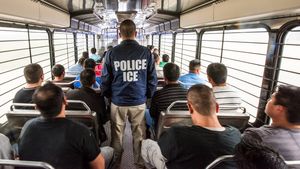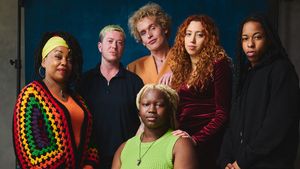Treatment GuideJust DiagnosedSex & DatingAfrican AmericanStigmaAsk the HIV DocPrEP En EspañolNewsVoicesPrint IssueVideoOut 100
CONTACTCAREER OPPORTUNITIESADVERTISE WITH USPRIVACY POLICYPRIVACY PREFERENCESTERMS OF USELEGAL NOTICE
© 2025 Pride Publishing Inc.
All Rights reserved
All Rights reserved
Scroll To Top
By continuing to use our site, you agree to our Privacy Policy and Terms of Use.
When Jimmy Hammerstein returned to New York in 1997 after a year and a half of being incarcerated on drug charges, he was given a one-month supply of his anti-HIV meds and a trip to a Brooklyn homeless shelter. He had only $40 in his pocket. There was no advocate on his side to help him into HIV services, help him find job training, help him find permanent housing, or help with any other kind of life support to keep him healthy, on his feet, away from dealing, and out of prison. 'You're trying to get your life straightened out again, and they put you in a worse place than you were,' Hammerstein, now 49, says of the shelter. 'There was no kind of support there. To me that was worse than jail.' Unable to support himself, Hammerstein went back to dealing drugs and was sent back to prison from 1999 until 2003. 'I didn't have any choice on how to make a few dollars,' he says, 'on how to live.' After his release in 2003 a fellow parolee told him about a program in midtown Manhattan'then called St. Clare's Hospital'which provides a multipurpose drop-in center for indigent HIVers. He was able to see a doctor and to get into a more permanent form of housing, provided by the city's HIV/AIDS Services Administration. Between 12% and 18% of the nation's HIV-positive population is currently incarcerated, according to official estimates. And thanks to a generation of tough-on-crime political tactics, programs to assist HIV-positive inmates with what these days is known as 'reentry' into society are few and far between. Fortunately, there are a few diamonds in the rough, providing a patchwork of health care and other types of services. And these groups are doing their part to not only improve the health and livelihood of one of the neediest populations in this country but also change an alarming statistic: A staggering 67% of the nation's prison inmates will return to the 'inside' within three years of release. The question remains, though: Can inmates, with such limited access, even find these groups in time to help them before something goes wrong on the outside? Ways of Working Together Palm Beach County, Fla., is one area where the local health department and community groups are forging partnerships to try and reach out to people like Hammerstein. Linda Warren is a human services program analyst with the county's health department. She organizes health fairs with the county jail to both educate inmates about HIV and to find HIV-positive men and women who will need help on the outside. Warren's agency collaborates with various local social-service agencies, such as an employment agency and the community court system, to assist former inmates with the gamut of life support they will need. Like many other prison advocates interviewed, Warren stressed that developing a rapport with the prisoner before release and subsequently remaining a stable presence in his or her life is of the utmost importance. Warren says she is a well-known presence in her area's correctional facilities, having posted her business card in all of them, and has e-mailed a letter to the local administrators to let them know she is available to help the inmates. 'If they don't know you, they can't come to you,' Warren says of prisoners who need help with reentry. One of the groups she refers HIVers to is the United Deliverance Community Resource Center, a church-based organization whose staff of eight does the 'legwork,' as project coordinator Caroline Williams refers to her outreach efforts. The group will call the county health department on behalf of the inmate and make a doctor appointment for five to seven days after his or her release. If this kind of planning is not made, parolees easily fall through the cracks and are likely to commit an offense again, prison advocates say. When it comes time for the appointment, one of Williams's colleagues not only will take the parolee to the appointment but will help with any paperwork, such as applying for Medicaid or AIDS Drug Assistance Program benefits. Over the next three to four months the center continues to monitor each person to help with finding clothing, transportation, and housing; fighting substance abuse; and even obtaining a Social Security card or driver's license. 'We don't look at them as a person with a disease. We look at them as a person needing help,' Williams says. 'We don't judge. We love.' This is some love that Hammerstein believes he could have used. 'The thing is, you got to do all the legwork,' he says. 'They're not going to do the legwork for you. So if you don't have the information, you're lost. I didn't get any. I did it all on my own.' Barriers to Full Success But love comes with a price tag, of course. The United Deliverance Community Resource Center scrapes together a patchwork of funding: $125,000 from Minority AIDS Initiative federal grants, $125,000 from state health department funds allocated for health disparities, and $50,000 more from a partnership with another agency. For the past five years the Centers for Disease Control and Prevention ran a $35 million pilot program to fund reentry programs for HIV-positive inmates in seven states that are among the highest in HIV incidence. Although the program has been widely considered a success, no new funds have been allocated while the CDC spends the next year analyzing its data, leaving local groups scrambling to replace the grant money. The CDC's Hugh Potter, who spearheaded the project, says that, unfortunately, the program was begun in flush times for public-health budgets and ended because the economy is in the dumps. But Rachel Maddow, who wrote her doctorate at Oxford on HIV in prisons, has a different spin: 'The federal government just screwed everybody on this project.' Fortunately, the federal government is taking increased notice of the importance of guiding prisoners out of prisons and jails with greater care. In January, President Bush proposed in his State of the Union address a $300 million reentry assistance program, albeit run exclusively by faith-based groups. In addition, the Council of State Governments is developing a manual to help states better provide the needed services. There are also success stories, like Hammerstein's, even if his is a roundabout one. He says he is no longer dealing drugs and is a volunteer with the New York City AIDS Housing Network, a nonprofit advocacy group for lower-income New Yorkers with AIDS that helps numerous former inmates navigate the city's tangled public-housing system. He hopes he can spread the message to other parolees that there is help available for them. 'Nobody talks for guys behind the wall,' he says. 'So I'm trying to help the next guy out so that he doesn't have to go through that nightmare.'
From our Sponsors
Most Popular
Lexi Love comes out as HIV+ after Trump deletes federal resources
January 23 2025 11:23 AM
Grindr is reminding us why jockstraps are so sexy and iconic
May 02 2025 5:36 PM
BREAKING NEWS: Trump admin moves to end federal HIV prevention programs
March 18 2025 6:10 PM
Trump's orders prompt CDC to erase HIV resources
January 31 2025 5:29 PM
Celebrating Black History Month with our annual African American issue
February 01 2025 3:28 PM
Tyler TerMeer vows to continue to fight for health care for all
January 28 2025 3:00 PM
Discover the power of Wellness in your life
March 26 2025 12:41 PM
Plus: Featured Video
Latest Stories
Dancer. Healer. Survivor. DéShaun Armbrister is all of the above
July 02 2025 8:23 PM
Two right-wing Supreme Court justices signal they may uphold access to PrEP and more
April 21 2025 4:10 PM
Broadway's best raise over $1 million for LGBTQ+ and HIV causes
April 03 2025 7:15 PM
Plus nominated for 2025 GLAAD Media Award
January 22 2025 12:42 PM
'RuPaul's Drag Race' star Trinity K Bonet quietly comes out trans
December 15 2024 6:27 PM
AIDS Memorial Quilt displayed at White House for the first time
December 02 2024 1:21 PM
BREAKING: Supreme Court rules to save free access to preventive care, including PrEP
June 27 2025 10:32 AM
1985: the year the AIDS crisis finally broke through the silence
June 26 2025 11:24 AM
Trump admin guts $258 million in funding for HIV vaccine research
June 03 2025 3:47 PM
500,000 Children at Risk: PEPFAR Funding Crisis
April 08 2025 3:51 PM
The Talk Season 5 premieres this spring with HIV guidance for the newly diagnosed
March 26 2025 1:00 PM
Jess King is here to help you live your happiest, healthiest life yet
March 24 2025 4:35 PM
A camp for HIV-positive kids is for sale. Here's why its founder is celebrating
January 02 2025 12:21 PM
VIDEO: A man living with HIV discusses his journey to fatherhood
June 10 2025 4:58 PM
HRC holds 'die-in' to protest Trump health care cuts
April 28 2025 2:11 PM
Season 4 of The Switch on resilience & radical self-love returns this spring
March 26 2025 12:20 PM
Gerald Garth is keeping people of color happy and healthy through trying times
March 11 2025 3:38 PM
This long-term HIV survivor says testosterone therapy helped save his life.
December 16 2024 8:00 PM
Ricky Martin delivers showstopping performance for 2024 World AIDS Day
December 05 2024 12:08 PM













































































